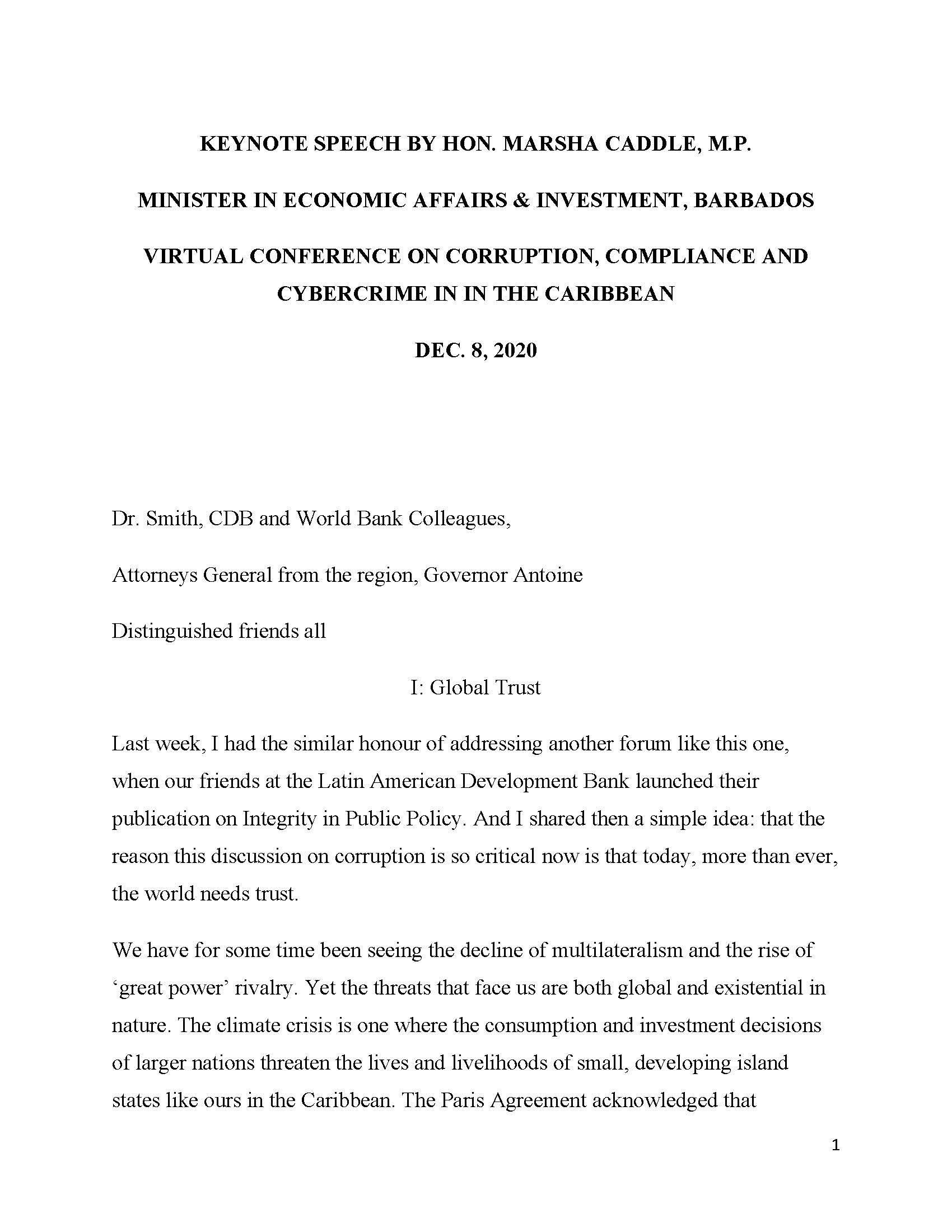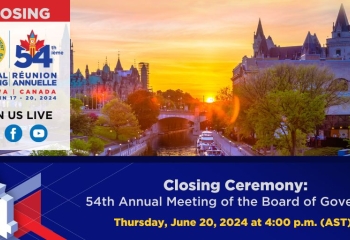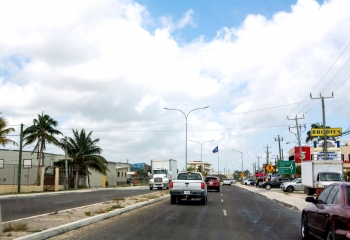Keynote - Caribbean Conference on Corruption, Compliance, and Cybercrime

I: Global Trust
Last week, I had the similar honour of addressing another forum like this one, when our friends at the Latin American Development Bank launched their publication on Integrity in Public Policy. And I shared then a simple idea: that the reason this discussion on corruption is so critical now is that today, more than ever, the world needs trust.
We have for some time been seeing the decline of multilateralism and the rise of ‘great power’ rivalry. Yet the threats that face us are both global and existential in nature. The climate crisis is one where the consumption and investment decisions of larger nations threaten the lives and livelihoods of small, developing island states like ours in the Caribbean. The Paris Agreement acknowledged that imbalance by, in principle, reaffirming the Warsaw International Mechanism for Loss and Damage associated with Climate Change Impacts, but that mechanism, though it predates the Paris Agreement itself, has yet to be realized. In the meantime, as small islands fight hurricanes, drought and extreme weather events ever growing in strength, that a decade ago might have destroyed 5 or 10% of our GDP but in more recent years, account for destruction of 100, 150, 220% of annual GDP, we simultaneously fight to make visible a vulnerability that should be apparent to all.
For decades, through our work with the Economic Commission for Latin America and the Caribbean, the Commonwealth Secretariat and others, we have been calling for the acknowledgement of work that has been done on a Vulnerability Index, which underlines the fact that GDP per capita is an insufficient measure to assess country need, especially of small states, and an insufficient measure to determine a global framework for aid and financial cooperation. It is insufficient because (1) the scale of the fiscal response often needed for countries to be truly resilient to a large economic shock is often not available to highly-indebted small states – fiscal rectitude on its own cannot insure a small, open economy against a major, global economic event; because (2) similarly, the intensification of the climate crisis and its potential to repeatedly cause complete economic wipeout makes it a systemic risk that cannot simply be dealt with through the markets; and (3) our open economies are not just open, but must now be open alongside externally imposed rules of an unlevel, international trading and financial system.
And so, what does all this have to do with trust? Well, simply, it is that the international community must trust the voices of the global South when we tell our stories and define our reality. When we describe our risk and vulnerability, and when we offer robust frameworks for the world to understand them. These frameworks are no less robust because they are created here, by people who have not just the capacity but also the lived experience.
The reason corruption in all its forms must be rejected is not only because it diverts resources away from important investments especially in health and education (countries where there are higher levels of corruption see corresponding lower levels of social investment, it is thought because these kinds of programmes less lend themselves to corrupt practice). But the reason corruption must be rejected is also because it erodes the trust needed for real development cooperation to take place. So that even in the establishment of the very architecture and processes that drive the global, anti-corruption agenda, there must be the transparency, accountability and level playing field that contribute to a global atmosphere of trust.
Barbados, like others in the region, faced with increasingly restrictive trade rules that affected the competitiveness of agricultural goods, was challenged to develop among other new, economic sectors, a competitive financial services sector. We did so in the face of ever-changing requirements to change tax policy and characterisations of several of our jurisdictions as tax havens and similar labels that along with the variously hued lists can do tremendous harm to a country’s ability to successfully attract and retain investment and realise inclusive growth.
The question is not whether Barbados or our neighbours accepts the responsibility of compliance with global standards; there can be no question that we do. The question is how is trust affected when in the absence of communication and fair consultation, countries’ economic well-being is put in jeopardy by mischaracterizations so easily made.
In May this year, at the height of the COVID pandemic, without prior warning or engagement, the EU blacklisted our regulatory regime to combat money laundering and terrorist financing despite Barbados having completed comprehensive reforms of the national AML/CFT framework, including significant legislative and policy amendments. Surely a commitment to the transparency the international community is calling on countries to provide would require that same transparency in, for example, the EU’s process and methodology for listing under their AML rules.
Then came the October blacklisting by the EU of Barbados and other countries in the region even as the world was fighting to develop and distribute the vaccine that could save our lives and livelihoods. Even as that global distribution will require not only the financial wherewithal that such lists threaten, but also the trust and global compact for fairness that would see all countries having equal access to the vaccine, and to survival. For that survival, we require not just health and medical solutions to the pandemic, but global, financial solutions that ring-fence COVID-related debt and refinance it over a longer repayment period. It is the only way in which this health and financial crisis will not lead to a lasting, global, debt crisis. That survival, and trust, go hand in hand.
II: National Commitments to Integrity
It is the same way in which countries, within our borders, also need trust.
When my government came to service two and a half years ago, there was pervading a lack of trust and an institutional decay that had eroded public confidence. Notwithstanding the overwhelming political mandate we were given that signaled a belief that the incoming leadership and administration were committed not just to doing things right, but to doing the right thing, it was still important to us to demonstrate that that belief was justified. It was important that we began by first addressing trust and integrity. So our first action, even before bringing the Integrity in Public Life Bill in July 2018, was to require that all MPs, Cabinet Ministers and Chairpersons of state-owned enterprises make a declaration of assets. We then brought an Integrity in Public Life Bill that was reviewed by a Joint Select Committee of the Upper and Lower House whose proceedings were conducted in public. The Bill was available on the Parliament website, at Post Offices and at public libraries. By public advertisement, we requested submissions on the Bill, including of political parties, interest groups and individuals.
The Prevention of Corruption Bill, brought to Parliament in 2019, makes it an offence to offer or accept a bribe; prohibits an employee from acquiring a private interest in contracts and agreements of public authorities, and proscribes bribery in the private sector.
The Public Finance Management Act, also of 2019, also having gone before Joint Select Committee, outlines the roles, responsibilities and code of conduct for Ministers, senior officials and public officers with respect to the financial affairs of the country. A new Central Bank Act just last week passed the Lower House and therein we establish for the avoidance of all doubt the independence of the Central Bank in monetary matters, its relationship with the Government, the process by which its leadership should be engaged and all the other matters of governance concerning that important institution.
When I leave you this morning and go to Parliament, there we will lay the Anti-Corruption and Anti-Terrorism Agency Bill for later debate. And shortly thereafter, a Whistleblower Bill will be before Cabinet for consideration.
Although the Integrity in Public Life and Prevention of Corruption legislation were introduced into Parliament at its last session, they did not pass the Upper House. And this is where we see the importance of a national commitment to integrity and public trust. Of a social compact that sees us agreeing that integrity is not a partisan matter; it is not an ideal to be picked up and set down when it does or does not suit. Integrity, transparency, accountability are not a part of democracy; they are democracy.
From June 2018, nothing that we were able to accomplish in stabilizing the economy and starting the journey of transformation could have been done without the kind of solidarity that draws its breath from trust. Without open discussions with the Social Partnership and the people of Barbados to make sure all had voice in the decisions being taken in their name. And so that legislation will be reintroduced during this session of Parliament, because ours must be the generation that resolves to materially fight corruption, rather than kick it down the road for our children to confront.
But a social compact implies that this is not just about Government. Last week, in similar discussions, I was asked the question: how would you incentivize the private sector not to engage in corrupt practices, and I found that very cute. So we stamp out corruption in public office, but we incentivize the private sector. WMt response was that we do have several incentives in our suite of legislation – they are called fines and sanctions. And it is not just big business; that is often the narrative – that big Government and big business collude to engage in corruption. But in fact, all individuals must reject the undeserving or improper benefits they may sometimes receive as a result of a system that lacks transparency or fairness. Corruption must find no safe harbour, not in high office, nor in narrow streets.
And one of the ways to foster that broad rejection of corruption is by establishing sound mechanisms for people to access public office and Government services. When we began reforming the town planning process in July 2018, as one of the first acts of our administration, it was not solely to unstick stalled investment, it was, importantly, to begin establishing a culture of accountability and transparency in the engine rooms of government. The use of data and technology and the modernization of government is one of the most powerful ways of removing the kinds of delay and discretion that breed corruption.
Tomorrow, my Ministry will receive updates from the public and private sector partners that make up our Doing Business Committee. From establishing an Electronic Single Window for Customs to a national payments system to a public investment dashboard; to online police certificates of character and drivers’ licenses, improved processing times for passports, an e-Planning system and an upcoming digital ID, by doing all these things we are showing that technology-based modernization, can and should be central to an integrity agenda.
The transparency of data is also key, and a new Statistics Bill next year will seek strengthen the independence of statistics and statistical reporting, and introduce data analytics to the development and monitoring of public policy.
But there are other ways in which ordinary citizens are affected by what for many of us can seem like a purely technical compliance agenda. Our work with the Caribbean Financial Action Task Force (CFATF) to achieve effective implementation of and compliance with the Financial Action Task Force (FATF) Forty Recommendations including to prevent and control money laundering and to combat the financing of terrorism has called for several legislative changes.
But to the extent that banks and other financial institutions are constantly being called on to update operations to satisfy compliance requirements, it can also be potentially destabilizing to small business and to individuals. While we target compliance, we must not sacrifice financial inclusion. As governments, ironically, are simplifying the doing business environment, banks’ customers are being asked to complete forms with details previously provided, to show up in person in an increasingly online world. We understand absolutely why new measures often become necessary, but if we are not careful in the what and how of these measures, burdensome compliance requirements externally imposed will erode our own investments in competitiveness. These conversations in this forum must confront those inconvenient truths.
The COVID-19 pandemic has thrust us further into a technology age than we might have anticipated, and done so more quickly. Matters like procurement must attract careful process and oversight, but must also be fit for the current purpose – a recovery and rebuilding that includes economic enfranchisement. Countries must have the flexibility to respond quickly to urgent need, to fast-track procurement for capital works projects during this period, especially those that re-engage separated workers; in Barbados, that number is in the region of 32,000. It is for this reason that we have committed to publishing such contracts in Parliament.
III: Trust in National and Regional Institutions
And finally, as you prepare for the next session on The Work and Role of Integrity Offices in Multilateral Development Banks, I come to the third level of trust: not just global, not just domestic, but institutional: our national and regional institutions must foster trust.
In a region of the size of ours, multilateral banks and other development and finance institutions must lead by example. We just last week debated a Central Bank Act not just for the purpose of strengthening independence. As I’m sure CDB has realized in its own corporate governance trajectory, as many do on this journey, independence without accountability is just a further concentration of power – just better hidden. In the Central Bank Act, the process by which the leadership of institutions such as regional banks is determined, the nature of their engagement with Government and the importance of transparency and fair process emerge as matters of public interest that must therefore withstand the closest scrutiny. Evidence accepted by independent offices of audit, risk and integrity must be unimpeachable; data must be robust. The institutions on whom we depend to help us tell our stories to the global community must be trusted to tell them truly.
Friends, more and more in this, as in all things, the world is watching. But perhaps more importantly, our children are watching. This meeting sends a strong message that trust and integrity are what drive us not because we are told it must, but because it is who we are. I wish you thoughtful discussions and clear, inclusive action.




